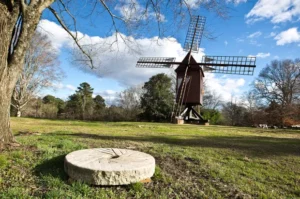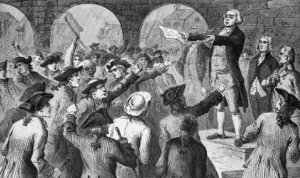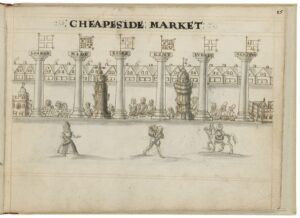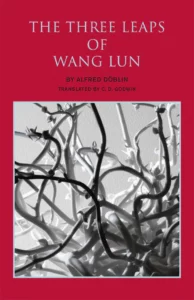Americanism Redux
April 25, your today, on the journey to the American Founding, 250 years ago, in 1774
Stop and listen for the sound.
https://youtu.be/zf5T2nb99RY?si=CiKAMaBerv6qgnZY
You’ll hear it, perhaps recognizing without realizing. It’s the sound that tells you where you are, the thing that you often hear at this time of day or this place of night.
Or maybe you won’t hear it, and then you’ll measure in your head the distance in time between the absence and that coming moment, once again, of familiar tones, daily din, and beautiful noise.
You just have to listen. For the sound.
(sound wave)
* * * * * * *
(like the one in Annapolis)
The sound is wind and the wind is up, fresh on your face. The wind rises to the point where, above you, the great wheel begins to turn. Inside the building, a slow rounding has started, with creaks of sound off columns of wood, rotating, their notches of teeth lining up with notches of teeth, making power. The interlocking tracks drive large stones round and round, laid flat, grinding the stuff between them. Grain turns to crackings and then to dust, flowing into vats, containers, buckets. Power in, powder out.
It’s the windmill granary in Annapolis, colony of Maryland. Daniel Dulany Jr and Daniel Wolstenholme, two partners in the wind-powered gristmill, are waiting for only a few more days before Plan A shifts to Plan B. They had hoped to lease the property, but after months of advertising, no takers. The double-Daniels worry that no one wants to take on the venture in these uncertain times.
Off Chesapeake Bay, the breeze is dropping. The great wheel loses speed, the revolutions slow down. The teeth-like wooden fittings can be counted as they grind to a halt. A dust trickles out 250 years ago today.
The bay wind is, at most, a soft breeze.
* * * * * * *
(part of the New York tea party, in Fraunce’s Tavern)
Normally, off Sandy Hook’s wharf on Long Island, you could hear the sounds of sea winds and shrieking gulls. You’ll need to wait for a while, though, maybe an hour or more, before you’ll hear them again.
Right now, 250 years ago, you’ll hear instead the boom of cannonfire, the ringing of bells, the shouts of people looking and pointing at colorful ribbons and cloth tied to a tall pole. It’s the celebration of a few hundred people. We’re a crowd, the supporters say. They’re a mob, the opponents say.
Off in the distance, you’ll see the masts of two ships, growing smaller, measured by your hand, then your thumb, then nothing. They’re returning to England, one still filled with unloaded and untouched tea, one lighter for having had eighteen chests of tea seized, smashed, and dumped into Long Island Sound. The local Sons of Liberty are yelling in triumph, shooting off artillery, decorating the Liberty Pole, and clanging any bell that can be found. The departing Captains Benjamin Lockyer and John Chambers will tell their stories after landing in English ports.
Off the wharf, the gulls are silent. They turn their heads and gaze at floating chunks of wood, the remnants of tea chests. Nothing to scavenge here, not yet, at least. When fish scraps turn up again on the surface, the shrieks will return, not long after echoes of cannon blasts and bell clappers fade away.
* * * * * * *
(long ago, down there, a married couple bickered)
The sounds of tension can again be heard inside the Black’s house in Urbanna, colony of Virginia. They’re arguing or, rather, she’s arguing and he’s pleading.
Mrs. Black wants nothing to do with Mr. Black’s plans. He wants to pack up and move either back to Scotland or further inland from the banks of the Rappahannock River. She hates the idea—having made friends in Urbanna and finally adjusted to the rough environment along the river. He’s straining to convince her that their house is falling apart and they can start fresh up near the falls. She fires back: too many mosquitoes, too much back-breaking labor to cut down trees and plow up ground, too many days of aching isolation. It’s a standard thing in the Black’s house as he urges and cajoles while she retorts and rejects. To the landlord who awaits payment and final plans for their next move, Mr. Black asserts, “I would do anything to make Mrs. Black again happy.”
Sure, thinks the skeptical George Washington. He’s heard these sounds from them before. He wants other sounds, of packing up and taking off.
* * * * * * *
(they won’t wait)
Sounds of grief, of prayer, of inquiry, of…mooing.
In Westborough, colony of Massachusetts, Reverend Ebenezer Parkman rubs his eyes after a long few days. First, it was the awful death of a woman suffering from a long illness; her husband was inconsolable. Then, the funeral for the woman, where people wept and sobbed and lamented. After, in private meetings with a man seeking to find faith, looks of joy and hopefulness in intense counseling and advising on the thorniest spiritual questions. It was a draining reversal of emotions and the sounds they make, from valley to peak. Finally, emptied of emotion, there was the need for the difficult physical chore of driving his cattle herd back to his home-farm. The cattle didn’t care about his church. They moo to be fed.
All that Parkman hears at the end of this is the soundlessness of rest and refreshing slumber. Collapsing into bed, the sweetest hours are sleep dearly earned. The sound of renewal.
* * * * * * *
(John Penn)
Sounds are sparse for a Quaker like John Penn. The spiritual services he attends are meant for quiet, punctuated here and there by words and calls moved by the divine. Spirit with and without sound.
250 years ago this Governor of the colony of Pennsylvania—named after his family—John Penn prays that the sound of the right words will be enough to end the dispute with the colony of Virginia. Pennsylvania and Virginia are at odds over which colony controls Westmoreland County in Pennsylvania. Penn knows his counterpart in Virginia, Lord Dunmore, has laws at his disposal for organizing militia as an armed force to execute laws and policies. Penn’s Quaker colony opposes armed force as a personal and public practice and thus has no similar militia to employ. Penn relies on commissioners he’s appointed to negotiate with the Virginians. War is possible and perhaps likely if Penn’s commissioners fail.
The sounds Penn doesn’t want to hear are gunshots and battle cries.
* * * * * * *
(bouncing off the cobblestones)
Sounds bounce onto the cobblestone streets of Boston from taverns, churches, shops, public offices, and moored ships. People are talking in dialect, slang, and cadences. Their words are not about family or friends, work or faith.
Instead, they speak of consumption and digestion. What’s gone into them is today’s news, brought from England and printed in newspapers. It’s nutrition for the sound of talk.
Today’s news in the Boston Gazette is rather different from previous versions. A unique wave have arrived: it’s less speculation and more substance. Guesswork stands aside as plans flex muscles front-and-center.
In the Gazette: Britain’s Solicitor General, Alexander Wedderburn, and the moment’s face of the empire, is ferociously critical of the colonists. Readers learn he has chastised the world’s best known American colonist Benjamin Franklin for his role in leaking stolen private letters from Governor Thomas Hutchinson. They also learn Franklin is ejected from his office of Deputy Postmaster General. Further, British officials are outraged over the tea protests and British armed power is amassing to punish the protestors. Locally, the departing Governor is using only seven Councilors to appoint the colony’s judges, defying custom and accepted practice for the advantage of increased imperial power. In a separate essay, a writer denounces Wedderburn for defending Hutchinson and ignoring ten years’ worth of public disapproval of the governor’s conduct. These reports are today’s news and today’s news is the talk on the street.
How much longer before other sounds are heard? Glass shattering. Voices cursing. Painful screams. Stomping feet. Clattering hooves. Explosions.
* * * * * * *
(she is Liberty)
Eight hundred fifty miles to the south, a different Gazette prints remarkably similar news in a strikingly similar time-frame. The South Carolina Gazette in Charleston, colony of South Carolina, offers much the same news to its readers as seen by those in Boston on the same day. Wedderburn. Franklin. Official reactions to tea protests. Embedded in the sharing of other local, port-town items of importance from public and private sources. The style of written news is more of a flourish, the details a bit more of a spike and sharpened edge, but overall the offering in the southern Gazette is much like that in the northern Gazette.
With one exception—the sounds of enslavement.
They exist in both places. The difference is the resonance and pervasiveness, each of which is easier to hear in the port town of Charleston. The Gazette’s communication of today’s news from England—which is really a rendering of the present six or eight weeks ago, having taken at least two to four weeks before then to build up to expression—enters into sounds of shouts and talk about today’s sale of existing enslaved, for today’s list of captured runaways, for today’s arrival of imported enslaved, for today’s departure of exported enslaved, for today’s availability of skills needed or skills required among enslaved, for today’s proposed law about enslaved, and on and on. Enslavement makes a lot of sounds.
A careful reader of today’s southern Gazette sees this item, tucked away in the tea-related news, the words of another strain of sound:
“Liberty, as a noble writer says, travels westward, where admitting a possibility she should faint from fatigue, may even expire on the utmost limits of the British empire, the people there, if ever she rises again, will not only have the supreme honor of her resurrection, but the comfortable reflection that they, to the last supported her, even in her expiring moments.”
You have to engage in real work to hear this sound within the pounding noise of enslavement. But to what end is such work done? Maybe the easiest way is to receive the news as part of the dominant sounds and make no effort at distinction. If that’s the case, then everything flows together, resembling news of a storm that happened somewhere else and may appear here, passing by.
The storm, its sounds and with Franklin’s help in his ingenious lightning-rod invention, the most electrifying and terrifying elements can be deflected. True?
Well, it depends on the storm and it depends on the shock.
Wait for the sound.
Also
(Petit Trianon)
The servants tidy up and make ready in the palace. Walls and floors dazzlingly clean. Furniture placed like pieces on a chessboard. Porcelain, windows, and mirrors sparkling. Candles and fireplaces poised for lighting. Outside, in the gardens, every bush, branch, and vine cut to a meticulous pattern of living art. Brilliant greens contrasted with the white and gray of pebbles, shells, and crushed stones. Birds chirp and sing. Eggs in the small nests tucked behind budding leaves. Water bubbles and gurgles. Harmony, peace, and elegance. Just right for the arrival, any hour now, of France’s King Louis XV, his official mistress Madame du Barry, and a small group of accompanying bootlickers and joketellers, all in carriages pulled by magnificent horses. This is Petit Trianon, a royal manor built for the latest craze of architectural style, the ancient Greeks.
The sound of another world brought to a living order, a realm of gods and isles, of beasts and urchins.
* * * * * * *
(the street where Earlom works)
In a twisting, curvy kind of way, a French artist is responsible for an English craftsman making sounds of disgruntlement 250 years ago today. The artist is Claude le Lorraine, dead for a century and creator of drawings—his specialty was Italian-influenced landscapes that blended spectacular forms of light and color with backdrops of classical, ancient ruins. The currently living 26-year old Duke of Devonshire in England loves Lorraine’s art, owning 200 of his drawings. The Duke has commissioned John Boydell to produce prints of these works in a single, bound collection. Boydell, in turn, has engaged Richard Earlom to do the actual work. This week the nimble-fingered Earlom has completed his 33rd printing, Lorraine’s drawing of three men pulling a rope tied to a stranded watercraft on a storm-soaked beach, with rough waves heaving a larger vessel up (and surely down) in the background. Earlom finishes his day’s work at his cramped space on, fittingly, the London street called Cheapside.
Earlom hears the sounds of bones in his aching hands. Boydell hears the sounds of an impatient aristocratic client. And the Duke hears the imagined sounds of surf and storm in the 33rd item of his 200-numbered collection.
* * * * * * *
(35 items)
Not far from Cheapside Street is the House of Commons in the British Parliament. Lord North has just instructed his aides to place twenty-seven more documents on the tables in front of the Commons’ members. These documents add to another eight documents laid there a few days ago. The documents are historical, from England as well as the colonies. The purpose is to give members of Commons a chance to understand the current situation and proposed legislation—called the Administration of Justice Act—that would be the second law to punish Boston and the colony of Massachusetts for the destroyed tea of the East India Company. Members can use the thirty-five documents in weighing whether or not to vote for the Justice law. During the Commons discussions of recent days, Member Sir Richard Sutton offered an insight with the documents in plain view: “If you ask an American who is his master, he will tell you he has none, nor any Governor, but Jesus Christ.”
The sound of debate continues.
* * * * * * *
(a fictionalized account of a factual thing)
In Shandong province on the Chinese Coast, Wang Lun sits among his followers. They began as dozens, expanded to hundreds, and now verge on thousands. Today a group of them hear the sounds of his words—he tells them of a change coming to the world, of the Buddha Maitreya who will rule over all existence. Wang Lun instructs his group in yoga and meditation, and tells them of the virtues of drinking the purest water. Purified water is the shared symbol of his believers. Skeptics and opponents of his words have dubbed the group the “pure water sect.”
Wang Lun speaks openly about himself as the return of Maitreya and the future emperor of China.
On one side of the world it’s tea steeped in water. On the other side of the world it’s water alone.
The sound of liquids, colored or clear.
For You Now
(do it closely when you decide)
This very second of the time around you has a sound. You know it. You feel a rhythm from it. When it’s not there, you notice. Until the next sound arrives and you judge from effect as to cause for comfort or concern.
Every sound has a source and meaning. We press them together as a way of moving through time. To do otherwise is to stay motionless—stuck—until the sound is solved. Remain motionless long enough and living becomes a doubt. When the doubt piles up, there’s really no point to have any tenses of time. It all becomes nothing, because we can’t manage the sounds.
So you move through, and with, and among, the sounds. That’s living.
Another part of living is to know when that important sound arrives. Take notice. Hear, listen, absorb. To not do so is to miss a moment that may never return. That’s living, too. The challenge is learning to sense and know when the sound is like the “she” in the southern Gazette, amidst all the things that are either wrong or not right, hearing “her” call before the moment expires.
Suggestion
Take a moment to consider: what sound do I hear?
(a place to hear)





















